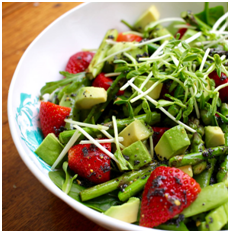Life has become busier than ever before in the 21st century.
Just take a moment to think about your daily schedule.
You get up as early as possible. Once you get up, you need to prepare breakfast, get yourself ready for the day, and make sure the kids are dressed and brush their teeth.
You hardly have enough time to get all of this done before heading out the door.
The rest of the day… well, could be one rush after the other.
This type of schedule makes it really hard to fit in the right diet and an exercise programme to help you maintain weight loss.
Gaining weight becomes inevitable if you are grabbing a croissant, or a chocolate twist and a cup of coffee for lunch every day from Starbuck, Pret or, Costa Coffee etc.
Sure, this may seem convenient, but I’m not sure if you know by doing this you’re loading your body with empty calories.
Medical research shows that you might be setting yourself up for weight gain, obesity, heart disease, diabetes, and more1.
What Are Empty Calories And Why Are They Bad For You?
If you have been lurking around the internet, searching for a solution to help you lose weight, you might have heard the term “empty calories” before.
Many people do not realise what exactly this is, so I thought it would be a good idea just to shed some light on the topic.
An empty calorie is a term that refers to food that will increase the number of calories you eat, but not contributes to your nutritional profile for the day.
A sugary snack, a croissant is a great example of empty calories, and alcohol is another one.
You load up on any type of processed sugary food – and sure this food has carbohydrates and even fat in it, but the problem is, these are not the “healthy” kind that you need.
The calories that you consume would essentially contribute to hormonal imbalances, weight gain and would not give your body access to the nutrients your body needs to stay healthy.

You see,
Every cell in your body goes through the metabolic process – and for these cells to remain healthy and functional, they need access to a wide range of nutrients.
There are many nutrients that you should ensure you give your body.
Studies have shown that nutrition plays a role in cellular function, as well as gene expression2.
Gene expression refers to the way the body and cells throughout your body read genes – in turn, and genes allow your body to create proteins and enzymes to interact with different functions.
A meal plan with the right nutritional profile would ensure that the correct genes are expressed and those that could cause harm, such as genes that lead to inflammation, are rather toned down and turned off.
There are micronutrients and macronutrients.
Looking for consultation on healthy diet and nutrition program which suits your body?
The main macronutrients that you need to feed your body daily include:
- Carbohydrates
- Protein
- Fats
Each of these plays a different role in the body.
Carbohydrates
Are known as the main source of energy – your body breaks these macronutrients up into simple sugars, and there are a few types of carbohydrates.
These sugars are distributed through your body.
Your cells can then use the sugars for energy.
Protein
If your diet lacks protein, you can experience a loss of muscle mass.
You could also experience vascular dysfunction, your immune system may not be strong, and you are at risk for oedema and physical weakness3.
The food we eat contains these nutrients.
Vitamins and Minerals
In addition to carbohydrates, proteins, and fats, we also need a steady supply of vitamins and minerals.
Zinc, magnesium, and selenium are three examples of very important minerals.
Vitamin B6 and D are two examples of powerful vitamins.
Click on this link now and book a FREE CONSULTATION with Jazz Alessi.
Eating Clean For Weight Loss
Now we come to another term that you might have heard before – eating “clean”.
What does this really mean?
We often hear people say that we need to have a balanced diet. We need to eat clean.
Yet, we see publications like one that was published at the beginning of this year – claiming that eating soil may be more beneficial for weight loss than taking weight loss supplements4.
Don’t worry, and I’m not about to tell you to start eating out of your garden.
What I want us to focus on here is a balanced and tasty diet – what you need to give your body to be healthier and to aid in your weight loss strategy ultimately.
A balanced diet means fitting meals and snacks into your daily life that are able to give your body the nutrients it needs, while also balancing the macronutrient profile – which means a good balance between your proteins, carbohydrates, and healthy fats.
Let’s take a look at some basic principles that apply to “clean” eating in general:
- Try to focus on picking whole natural foods instead of processed foods
- Prefer unrefined foods and try to stay away from refined food options
- Have a good balance between your macronutrients
- Limit your intake of sugar and salt, as well as unhealthy fats
- Avoid drinks that will add too much to your daily caloric intake

Now, let’s take a look at different food groups you should ideally add to your daily meal plan5:
- Vegetables: include vegetables and fruit into your daily diet. It is recommended to have a bare minimum of five portions each day.
- Fibre: try to add fibre-rich foods to your diet.
- Starch: starchy foods can be the base of some meals. These include whole meal sourdough bread, buckwheat pasta, whole rice, and sweet potatoes.
- High-Quality Protein: include high-quality protein sources. Kidney beans, chickpeas, lentils, tofu, spinach, and kale are all great examples of protein-rich foods.
- Fats: when consuming fats, make sure it is a good kind of fat. Prefer unsaturated spreads and oils. Just do not use too much of these.
- Water: Drink enough fluid to ensure your body can remain hydrated during the day.
When it comes to Weight Loss Diet Plan specifically, it is especially to add foods like the following to your diet:
- Oranges
- Brussels sprouts
- Flaxseeds
- Legumes
- Oatmeal
Any plant-based whole food that is high in fibre will ultimately help to improve insulin sensitivity in your body and will be useful for reducing insulin resistance.
This, in turn, can be beneficial for fat metabolism in your body.
Building A Healthy Diet Plan That Helps With Weight Loss
Now that you have a better understanding of what empty calories are and why it is important to include balanced, and “clean” eating habits in your daily meal plan let’s continue.
The question that now remains is – how do you build a meal plan that is both balanced and will contribute to weight loss?
The quick answer to this question would be to add nutritional whole-foods into your diet that is also able to keep you full.
This way, you can avoid those mid-day cravings that make you move closer to some of the sugary snack in the office.
The principles of clean eating and the different categories of food that I touched earlier gives you an idea of what to include.
Now, let’s consider a few factors that can help with the fullness factor:
- Fibre: Fiber is considered a carbohydrate6, which means it forms part of your macronutrient profile. The body does not digest fibre as it does with other types of carbohydrates, however.
Instead, fibre helps food move through the body and ultimately helps the digestive system expel of waste materials.
In addition to this fiber doesn’t always count as carbs since, once ingested it is metabolised by gut bacteria into fatty acids.
Also, there are a few types of fibre and different foods have different metabolic effects.
However, studies have found that fibre is very useful for improving satiety7 – this means if you add more fibre to your meal plan, you’ll end up feeling less hungry.
Try to include fresh oranges, bananas, leafy green vegetables, grains, nuts, beans, legumes, strawberries and raspberries to your diet.
Click on this link now and book a FREE CONSULTATION with Jazz Alessi.

- Protein: Protein is another excellent addition to your diet for improving satiety, but it is crucial that you get your protein from quality sources whilst reduce cholesterol levels.
One study8 found that increasing protein intake can greatly reduce hunger throughout the day, and may also be beneficial for improving blood glucose and insulin control.
Try adding almonds, peanuts, chickpeas, lentils, tofu, edamame, tempeh, and quinoa to your diet.
- Spices & Herbs: You already use your spices and herbs to flavour foods, but did you know that some of these can actually help to improve your satiety? It’s true. Ginger9 is an excellent example, but don’t be afraid to experiment with different herbs and spices.
Try to add more ginger, garlic, rosemary, oregano, basil, pepper, cumin, turmeric, and other spices to your meals.
This can be another great way for you to feel full for a longer period after you have had a meal.
Fitting This Into Your Busy Schedule
At the start of this post, I mentioned how busy our lives had become today.
With such a busy life, it is hard to really look after yourself – you don’t get the time you need to prepare healthy and clean meals.
You probably find yourself too busy to get some time in for exercising too.
Fortunately, if you work smart, then you will be able to get all tasks on your schedule ticked off, and you will still be able to look after yourself.
Here are a few tips to help you fit a healthy meal plan and an exercise routine into your daily life:
- Go to bed earlier: Sleep is important, and this would allow you to get up earlier in the morning.
You will have more time to prepare everything for the day – and you might even get a chance to practice a few exercises.
Click on this link now and book a FREE CONSULTATION with Jazz Alessi.
- Prepare some healthy snacks in advance: Perhaps spend some time on Sunday afternoons and bake up a few healthy snacks that will last you through the week.
You can pack one of these snacks into your lunch box and take it with you to work.
If you get hungry, reach for the healthy snack instead of the “doughnut” stand.
- Swap the television for something better: We all like to get home and spend some time in front of the television.
After a hard day’s work, you surely deserve to kick out your shoes and just relax.
One episode quickly becomes two, or even three.
Before you know it, it is time to go to bed.
Try to limit your time on the couch at night – rather try to spend some time working on your meal plan, setting out the ingredients for the next day’s meals, or going for a run.
- Get Support: If you do not have the time or experience to develop a personal training programme that will be helpful for you, consider hiring someone to help you out.
As an elite personal trainer in London, I will create the best-customised programme that is perfect for you – a nutritional meal plan, along with a strategic exercise plan, that will be easier to fit into your busy day.

Final Words
Staying healthy can be hard when you live a busy life.
With a schedule that is packed with meetings and tasks, you hardly get the chance to prepare a healthy meal or work out.
This should not be an excuse, however.
Start with time management and see what tasks are taking up too much of your time.
Consider where you can squeeze in a few minutes for an exercise routine and plan your meals ahead.
If you do not know where to start, get in touch with me now.
Schedule a FREE CONSULTATION and let’s set up together a personalised training programme that can fit around your busy schedule, help you tone up, burn excess fat fast, and live a healthier life.
References
1 Multiple Authors. Determinants and Consequences of Obesity. American Journal of Public Health. Sep 2016. https://www.ncbi.nlm.nih.gov/pmc/articles/PMC4981805/
2 Y. Chen, M. Michalak, L.B. Agellon. Importance of Nutrients and Nutrient Metabolism on Human Health. Yale Journal of Biology and Medicine. 28 Jun 2018. https://www.ncbi.nlm.nih.gov/pmc/articles/PMC6020734/
3 G. Wu. Dietary protein intake and human health. Journal of Food & Function. Mar 2016. https://www.ncbi.nlm.nih.gov/pubmed/26797090
4 K. Lumpur. Eating Soil Can Aid In Weight Loss. Inquirer Lifestyle. 1 Jan 2019. https://lifestyle.inquirer.net/319695/eating-soil-can-aid-in-weight-loss/
5 Eat well. NHS. https://www.nhs.uk/live-well/eat-well/
6 J. Slavin, J. Carlson. Carbohydrates. Advances in Nutrition: An International Review Journal. 3 Nov 2014. https://www.ncbi.nlm.nih.gov/pmc/articles/PMC4224210/
7 M.J. Clark, J.L. Slavin. The effect of fibre on satiety and food intake: a systematic review. Journal of the American College of Nutrition. 2013. https://www.ncbi.nlm.nih.gov/pubmed/23885994
8H.J. Leidy, C.L.H. Armstrong, M. Tang, R.D. Mattes, W.W. Campbell. The Influence of Higher Protein Intake and Greater Eating Frequency on Appetite Control in Overweight and Obese Men. HHS Public Access. 27 May 2014. https://www.ncbi.nlm.nih.gov/pmc/articles/PMC4034047/
9 M.S. Mansour, Y.M. Ni, A.L. Roberts, M. Kelleman, A. RoyChoudhury, M.P. St-Onge. Ginger consumption enhances the thermic effect of food and promotes feelings of satiety without affecting metabolic and hormonal parameters in overweight men: A pilot study. HHS Public Access. 1 Oct 2013. https://www.ncbi.nlm.nih.gov/pmc/articles/PMC3408800/



